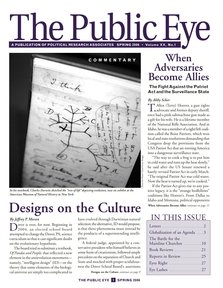Commentary
Dover is over, for now. Beginning in 2004, an elected school board attempted to change the Dover, PA, science curriculum so that it cast significant doubt on the evolutionary hypothesis.
The board tried to substitute a textbook, Of Pandas and People, that reflected a new element in the antievolution movement— namely, “intelligent design” (ID)—or the theory that some elements of the biological universe are simply too complicated to have evolved through Darwinian natural selection; the alternative, ID would propose, is that these phenomena must instead be the products of a superintending intelligence.
A federal judge, appointed by a conservative president who himself believes in some form of A religious belief that the universe and life are the product of acts of divine creation rather than via natural processes. Learn more , followed ample precedent on the separation of Church and State and mocked with proper assiduousness the Dover School Board’s assertions that theirs was not a religious crusade marching under the camouflage of flagella and microbiology.
Although no one believes that we have heard our last from the Intelligent Design bunch, it may be useful at this resting point to take a longer view of the controversy. In the 1925 Tennessee Scopes trial, invoked ritually every time another squabble erupts over whether to teach Darwin or the Bible in the public schools, the antievolutionists still had the confidence to come out hot for Genesis in its narrowest interpretation, rather than take cover behind “Intelligent Design” or some other linguistic squid ink.
Led by one of the most famous men in the United States, the Democratic politician William Jennings Bryan, the Tennessee antievolutionists in 1925 also made clear that the tension between the Bible and Darwin’s theory of natural selection was not their sole concern. Although they surely felt their dignity tarnished by Darwin’s assertions of a common ancestry between humans and beasts—especially monkeys —much of their animosity toward evolutionism grew out of its larger commitment to “materialism.” Commonly used today to denote an unseemly attachment to consumer goods, “materialism” in Bryan’s day conveyed more a sense that the scientific method—seeking material explanations for natural phenomena, such as explaining why species change over time—was literally “disenchanting” the world by removing a role for God to play. Darwin and his scientific allies seemed to have barred God from playing a role in the natural world.
Like many of his own allies, from the Vatican proper to the “Protestant Vatican” of Nashville, TN, Bryan feared that a reliance on materialism had left us with a degraded, godless culture—and the conceptual connection he made in the 1920s from the Origin of Species to flapperism, jazz, and bathtub gin has changed today primarily in its form, not its substance. A culture that relies purely on materialist explanations is a culture that has given up on the possibility of the miracle, on the belief that God may intervene in the natural world through whichever mechanisms he chooses, including particularly the saving grace of Jesus.
A grab-bag of controversies have persuaded a small number of conservative evangelicals that they are an aggrieved minority in America.
Backed by a wide majority of the American people, Bryan in 1925 could be quite open about America’s need to follow the natural history lessons laid out in the first chapters of Genesis. If the majority believed it, then what right did a small minority of natural scientists have to impose their narrow vision of Darwinism on the nation’s schoolchildren? More than half a century of court cases mandating a clearer separation of church and state have backed Bryan’s heirs into various evasive strategies, from claiming to teach a neutral “creation science” (rejected in 1987’s Edwards v. Aguillard as simply another attempt to disguise religion in a lab coat) to the more recent ID proposals for schools to “teach the controversy” between evolution and ID with a wink at supporters who are in on the game. We might hope that these calculated adaptations have in many ways weakened the original organism.
But a look at the so-called “Wedge Document,” a long-term strategic plan for ousting evolution and renewing America’s Christian character developed at Seattle’s well-funded Discovery Institute in the 1980s, also reveals the persistent vigor of the anti-materialist impulse as it funnels itself through the fight against evolution. Although no longer able to trumpet its religious goals as openly as Bryan did (and, in fact, the Discovery Institute initially denied having anything to do with the wedge document), in the end, the similarity in substance is paramount. The Wedge writers view “scientific materialism” as the very source of almost all destructive “moral, cultural and political legacies” of the past century and a half. What are these legacies? Bathtub gin has shuffled off the stage, originally replaced by Freudianism, utopianism, and communism, but now more recently supplanted by liberal attitudes toward personal responsibility, theology, and, in a nod to the Discovery Institute’s well-heeled supporters, “products liability.” Envisioning this behemoth of scientific materialism as a giant tree whose trunk can be split with a thin wedge at its weakest point (evolutionary theory, apparently), the wedge strategy commences with Phillip Johnson’s 1991 brief Darwinism on Trial and develops the various means by which “Intelligent Design” and its related arguments can be used to widen the gap so that Americans may approach the ultimate goal of redeeming American culture from scientists, doctors, lawyers, and actuaries.
Assuming that commitments to reforming psychoanalysis or tort law are not enough to charge the faithful, it is clear from interviews with the men and women at the leading edge of the wedge that they see the ID fight as part of the broader culture wars of the last thirty-five years. These include the school wars over prayer, sexuality education, displays of the Ten Commandments, and a grab-bag of other controversies that have persuaded a small number of conservative evangelicals that they are an aggrieved minority in America, suffering persecution at the hands of the courts, the schools, and Hollywood liberals.
“But a look at the so-called “Wedge Document,” a long-term strategic plan for ousting evolution and renewing America’s Christian character developed at Seattle’s well-funded Discovery Institute in the 1980s, also reveals the persistent vigor of the anti-materialist impulse as it funnels itself through the fight against evolution.”
Many of their grievances are cranked up within the echo chambers of talk radio rather than real impositions on the local concerns of any one school or congregation, but the public schools make an ideal staging ground for activism. Well-organized groups can capture small local elections or take advantage of other political anomalies, such as the provision in Kansas that the state board of education be elected from local districts rather than appointed by, say, a governor. It is these national issues being filtered through the local level that makes for such rich headlines and, in the cases of both Dover and Kansas, international mockery.
Ridicule stings, but for the committed Christians on the leading edge of the wedge, such treatment is merely more evidence that a A neutral term used to describe someone or something, such as in law, as non-religious in character. Learn more , materialist culture has decided to throw them to the lions—or, rather, continue to lump them in with the monkeys. Thus, Judge John E. Jones’ thumping decision in the Dover, PA, case stands as a greater vindication yet for their continued crusade.
Further, while the tips of wedges can be broken, the stump often remains behind. The courts may retain their reason; voters may turn the rascals out, at least temporarily. But at the end of the day, without a strong mandate to teach evolution as their professional training has prepared them to, how many public school biology teachers will open the textbook, look down into the faces of their pupils, and decide it’s just not worth the fight?

